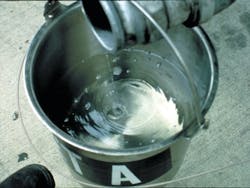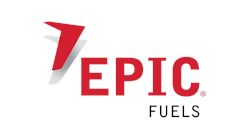I feel there is a hidden threat to the safety of aviation; it appears to me that some FBOs and fuel suppliers like to live in the past when it comes to risk management. I just hope they realize that in doing so it brings a tremendous amount of risk upon their customers, the aircraft they operate, the passengers and crews, and ultimately upon their own organizations.
I am not sure if they live by the adage that "we have always done it that way and have never had a problem." Interestingly enough these are the exact same words uttered by people in the wake of some serious incidents; they just add one word at the end — "before."
On the other end of the spectrum are those who do it right. I have been in the aviation industry for 34 years, and I have witnessed some superb examples of FBOs and fuel suppliers that have exceptional safety standards. One of those FBOs is Castle & Cooke Aviation at Paine Field in Everett, Washington (PAE).
General manager Terry Wilcoxson has been in the business for decades, so I asked him about the old days and the practice of “free access” to the fuel farm. “The mailboxes were a dead giveaway,” Terry recalls. This matched my own memory of my first day on the job as line manager and seeing these mailboxes at the large airport fuel farm used by the three different branded FBOs on the field. They were the typical rural mail boxes you see along country roads. Some had the red flag up, but not to signal the mailman that there was outgoing mail, but to signal the line personnel that they had received a load of fuel and the paperwork could be found inside the mail box.
Free access meant that nobody from the FBO was conducting quality control (QC) checks and supervising the off-loading of the fuel. This sounds crazy given the industry standards and fire regulations that this practice violates today. However, I can tell you with certainty that some line personnel still meet the driver, take the paperwork, then walk away without checking the fuel (violation of ATA 103) or monitor the off-loading (violation of NFPA 407).
It is a recipe for disaster when you combine this practice with fuel suppliers who do not confirm that individual fuel delivery drivers are trained and certified in aviation fuel handling and do not require and confirm that only grade dedicated equipment is used to haul the fuel. This means that the truck and/or trailer are dedicated to hauling just avgas or jet fuel, not both and not other products. We don’t even like trucks that have been steamed and dried preferring full time grade dedicated equipment.
The airline fuel quality control standard followed by the airlines, the U.S. Government, and the Military titled ATA-103, requires the use of grade dedicated equipment. ATA-103 is the industry standard applying to how aviation fuel should be handled.
QUALITY CONTROL
Educating FBOs to the importance of meeting or exceeding industry standards is incorporated into our annual on site inspections of every branded location, our regional QC seminars, and on our training website.
As a fuel supplier it is incumbent to invest in risk management practices and personnel. Some seem to be content to follow the practices of others in an effort to limit overhead cost. In fact carriers have recently expressed concern that many suppliers do not require grade dedicated equipment. This is a practice we adopted ten years ago and believe it is vital to proper quality control practices.
Business 101 teaches us that responsible business conduct includes product quality, workplace health and safety, protection of the environment, protection of workers, and compliance with laws and industry standards. The first order of business for a smart opposing attorney in a lawsuit against a fuel supplier or FBO in the wake of a loss would be to educate the jury of the existence of some very detailed industry standards that apply to aviation fuel manufacture, transfer, storage, and delivery into aircraft.
Non-compliance with our industry’s standards brings tremendous risk.
It is due to incidents like the following that ATA-103 was modified to require grade dedicated equipment and therefore should be a fuel supplier’s policy; our QC training team was on site at a dealer’s location when a transport truck arrived to deliver a load of jet fuel.
They took the opportunity to use the delivery as a training exercise. During the visual inspection of the fuel they saw a brown scum lining the bucket. Multiple samples were drawn after wiping the bucket clean but the scum returned every time. They asked the delivery truck driver about the previous load. He indicated it was jet fuel. They asked what was on before that and again he indicated jet fuel.
Then they asked about the previous load to that and the driver admitted hauling biodiesel which contains FAME (fatty acid methyl esters). Further investigation revealed that the truck had hauled biodiesel, and then two separate loads of jet fuel from the suppler that does not require grade dedicated equipment to one of their branded FBOs that did not inspect the fuel before it was delivered. They refused the delivery before it was put into our FBO’s tank. The FAA and aircraft engine manufacturers take FAME contamination very seriously.
CASUAL CONTAMINATION
Even the automotive industry is concerned about "casual" contamination. In a study released in September by the Battelle Memorial Institute sponsored by the Petroleum Equipment Institute (PEI), carry-over contamination of ethanol from transport trucks was sighted as a possible link in the severe and rapid corrosion caused by microbial growth that has been observed in systems storing and dispensing ultra-low sulfur diesel (ULSD) since 2007. This study can be found at: www.pei.org/Portals/0/resources/documents/ulsd_final_report.pdf.
Untrained drivers are not aware of the risks associated with hauling aviation fuel. They don’t know what they don’t know. Clean trucks, residual fluids from previous loads, and clean hoses are not a concern to them. Some drivers believe that all aviation fuel is the same and therefore it is okay to mix avgas and jet fuel.
Terry Wilcoxson at Castle & Cooke related another incident when a driver attempted to make a delivery and he noticed that the driver was having a very difficult time wrestling with the delivery hose he was going to use.
“I grabbed the hose from the driver and it felt very heavy” relates Wilcoxson. "So I took the cap off the end and discovered the hose was full of automatic transmission fluid.”
“It scares me to death to think of what could have happened if we had not discovered his mistake," he recalls. Wilcoxson knows that even the best of aviation fuel filters on tanks farms, refuelers, and aircraft will not stop chemical contaminants.
We wonder if several different cases we have seen might somehow be related to 'casual' contamination of fuel from the residue of previous loads when suppliers do not use grade dedicated delivery equipment. These include corrosion in aircraft wing tanks, gross amounts of microscopic particles in aircraft fuel filters, and clear evidence of the effects of microbial growth.
I also wonder about aircraft operators who may have had to complete an engine hot section overhaul hundreds of hours before it was due caused by deposits in the engine. I know from experience that chemical contamination of aviation fuel can cause deposits in the hot section leading to cracking of components. One of our helicopter customers experienced this and determined the root cause was that his suppler had used delivery trucks that had previously hauled lube oils.
SAFETY FIRST
A fuel supplier training drivers of the important differences in handling aviation fuel takes time and resources, as does confirming that the individual driver is actually trained and that the trucks are grade dedicated before the load is dispatched.
It’s always easier and cheaper to run your business by ignoring industry standards. It’s harder and more expensive to do it right. For example, at a time of limited carrier resources caused by natural disasters, refinery shutdowns, and market price spikes, just finding a truck and driver is tough enough, but doubly tough when you require they are aviation trained and the equipment grade dedicated. Short cuts and saving money do not go hand-in-hand with ensuring aviation safety.
Meeting all applicable industry standards and therefore operating within the law is the only way those entrusted with the safety of aircraft and passengers should operate. If you are in the aviation fuel business, you can’t just talk about safety; talk the walk, and walk the talk.
About the author: Michael Mooney began his aviation business career in 1978 and since that time has served a management role in aviation-related operations including, FBOs, airline ground support, into-plane fueling, and a corporate flight department that operated a large fleet of aircraft.


